AFTERILOVAISK. “Nickname Moskit ”
“ Yes, I understood that I was going to war, but you can’t be ready for war, for death and for what happens in a real fight. ”
Nickname Moskit, “Donbass”
He went as a volunteer to the Donbass Battalion in May 2014. He is a Kherson citizen. He watched TV. He was on Maidan in 2004, then he watched it in 2014. He was not indifferent to the events.
But he decided that it was time to do something and not only to watch TV. First, I called to the Dnipro-1 Battalion. I was told there: “You need to wait for two weeks, we will call you”. And then I saw the fight in Karlovka shown on TV. I noticed a man there, about 60 years old, wearing a Soviet helmet, I looked at it, and I was hooked that I was healthy, I was in the army and I was watching it on the couch, while people were dying.
I saw the post of Semen Semenchenko that he needed people “ready to die for their Motherland”. Somehow it was literally. And that’s how I got to Kyiv to the division 3027, where the battalion Donbass Battalion was based. It was in Novi Petrivtsi.
There, since June 7, I had already been officially in the battalion. Before that, there were training, instructors. My family did not know anything, I did not tell anyone. I admire families who are ready to wait. It happened that my mother first found out that I was at war when she saw me on YouTube that I was in captivity. That interview was a shock for her, as a result, she had a heart attack. It’s all complicated. Friends also did not know: then they asked how I decided to do it. Unfortunately, in our country, many people are ambiguous about this. Because sitting at home on the couch and watching the news on TV, it’s easier than doing something, participating, risking your life. Even for the sake of people who sit in a cafe, drink beer and do not understand what is happening.
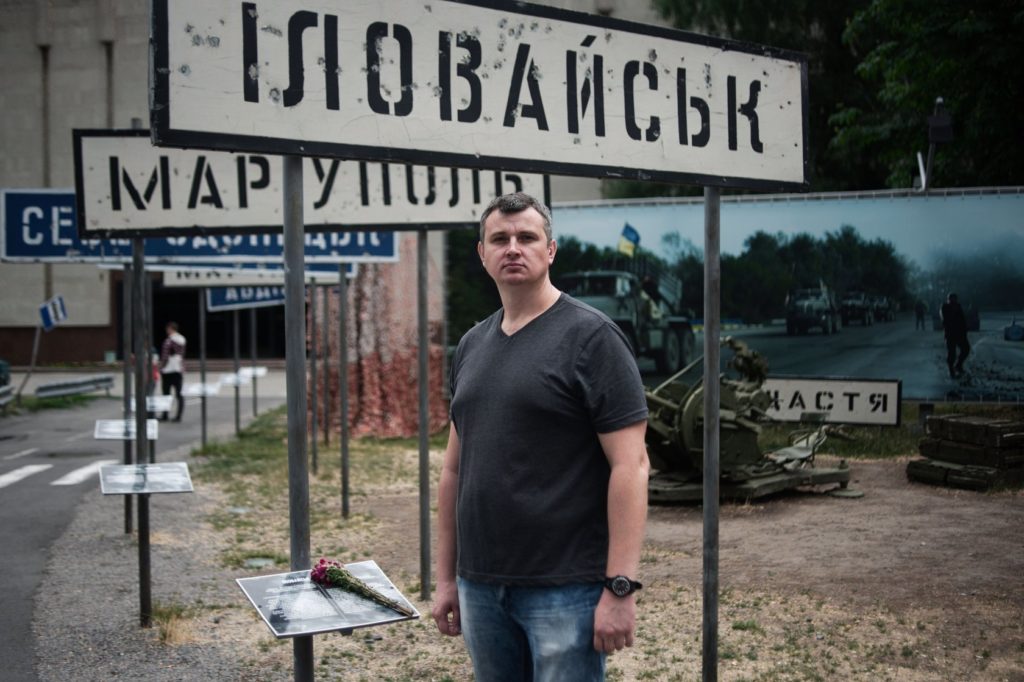
My friends, of course, have changed. I have stopped communicating with many of them. Because it is impossible to convince a person if he/she looks at the situation in a different way. He can tell you things that he seems to know even not being there. Such stupid things up to that are the land … to die for the land … And to explain to a man like this when a neighbor came to your house and imposed his opinion on you. How should you live, what should you do, and you had to accept this? And when you live in a city where there are no military operations, it seems to you that everything is fine, but if you are a normal person, you should understand you have no fighting in the city, because someone is fighting at this moment, risking his life, so that infection does not come to you in the city. But most do not understand. Because we Ukrainians have a proverb “I have nothing to do with it.” It does not concern me and whatever, let it be somewhere.
Although, the year 2014 showed how many “not indifferent” people we have. Starting from the Maidan and ending with the same guys who risked their lives, grandmothers who gave their money, and people who were cold and gave the last, carried everything for the sake of the common deal. So, it was a global strong message. I thought that everything would change quickly, but it turned out that everything was delayed.
And the word volunteer was terrible for them. Volunteer in their understanding is a superman, a super-military, super-commander who is ready for war, goes and fights.
I had the only experience in the army, in the National Guard (1994-1996). I had nothing to do with the war. Yes, I understood that I was going to war, but you can’t be ready for war, for death and for what happens in a real fight. This is not what is possible to imagine.
Before the war I was engaged in repairs, I earned well. It happened when I went to the Donbass Battalion, where everything was on volunteerism, and I allowed myself to buy a bulletproof vest, a uniform. I equipped myself and bought everything I could afford. I had never seen myself as a military man. I served in the National Guard for the first time. I had the opportunity to stay there, to make a career. I did not want it because it’s not mine – form, chatter, and commands.
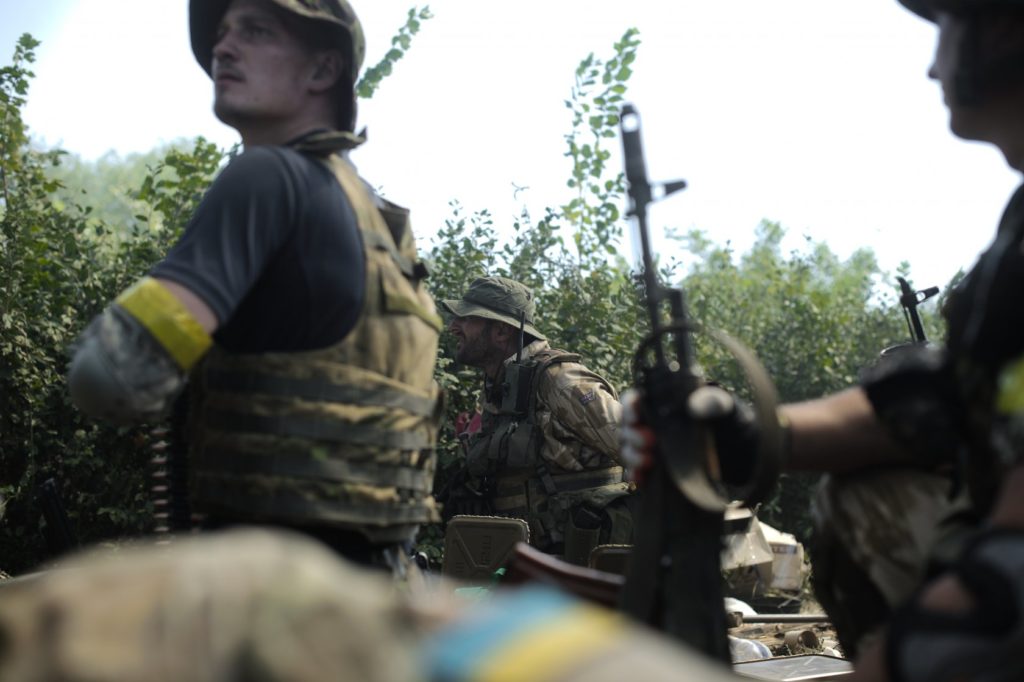
We arrived at Ilovaisk in the evening and the next day I with my friend volunteered to stay at the intersection. After the first shelling, we started shouting at the radio: “What are we supposed to do?” “Well, dig out!”. We started to dig out with improvised means, and how could you dig there as it was asphalt road? And if you went a little bit aside, you couldn’t observe the intersection. And we had a sector to observe “green” on the Vinogradnaya street and to observe the street. Of course, it was impossible to dig out there. Therefore, the question became what to do.
We decided to bring the sleepers among shelling.
Then my friend was wounded by a splinter. I was given three people. The four of us began to keep this checkpoint (2nd checkpointed.). We brought sleepers, which were easily shot by 5.45 and 7.62, we were hiding behind these sleepers. When there was a shelling, we dug for us a shallow trench, jumped into this trench, and sat there. We did not leave this checkpoint during the day or night.
There was a situation when I put stretch marks using grenades RGD-5, and I went to my commander, said that I needed more grenades. We put stretch marks the side of “green” because we did not have a thermal imager, anything. We sat there at night and did not see anything, what was going on there in “green” side. There were shelling but how to shoot? If we shoot, we would signify us, so that something accurately arrives … that is, it was dangerous
The commander shouted at me because intelligence could be killed on those stretch marks. They gave me signal rockets. And every evening I went with a comrade to the “green” side and put those rockets. There were different types of curiosities.
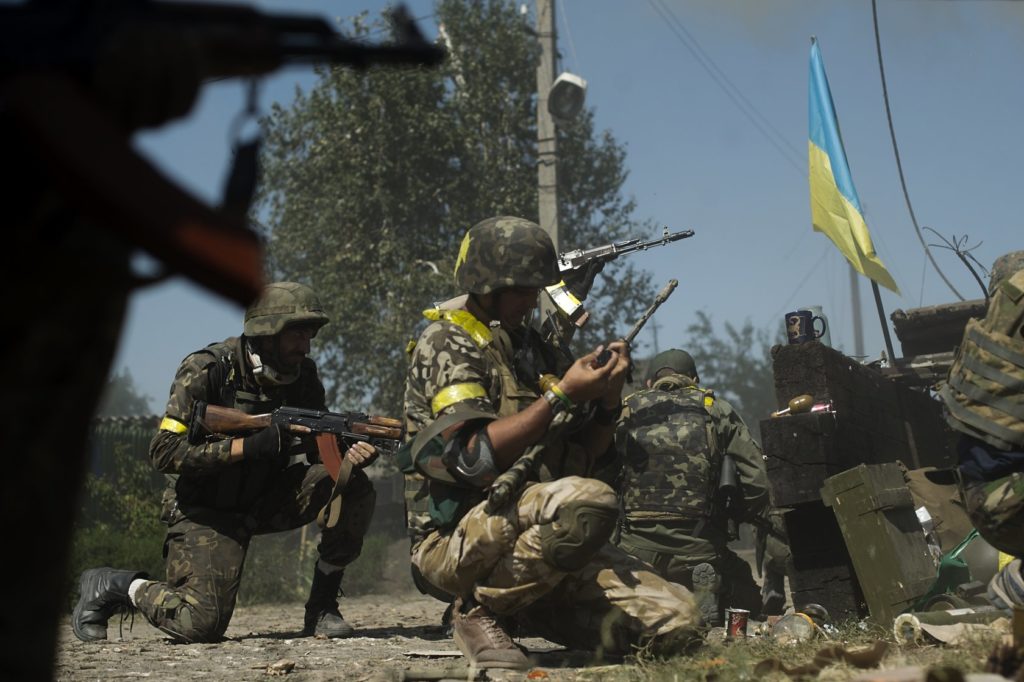
Photo: Maks Levin
You thought you were going to put or shoot a rocket and maybe separatists had seen it and also put stretch marks. Because they approached the “green”, they were close to us and fired at us. Bullets whistled about 400 meters, 200 meters. We, personally, did not see the enemies in “green”, but they fired constantly. Because it was a corner of those streets – an intersection and we were seen from everywhere. There was such a situation when the panic started and someone screaming on the radio that mine laid very closely only five meters away. And the humor was on the radio: “Let’s help separatists, they’re all listening.” It’s all because people were not ready for such situations.
It was another situation with signal rockets. “Cosmos” (call sign, the intelligence of Donbass, died – Ed.), When I was walking with my group, I agreed with him, – when you would go, removed the rockets because the signal would work … And he said he would not remove, he would find them if separatists found and passed and I would be thinking that the sector was protected. .
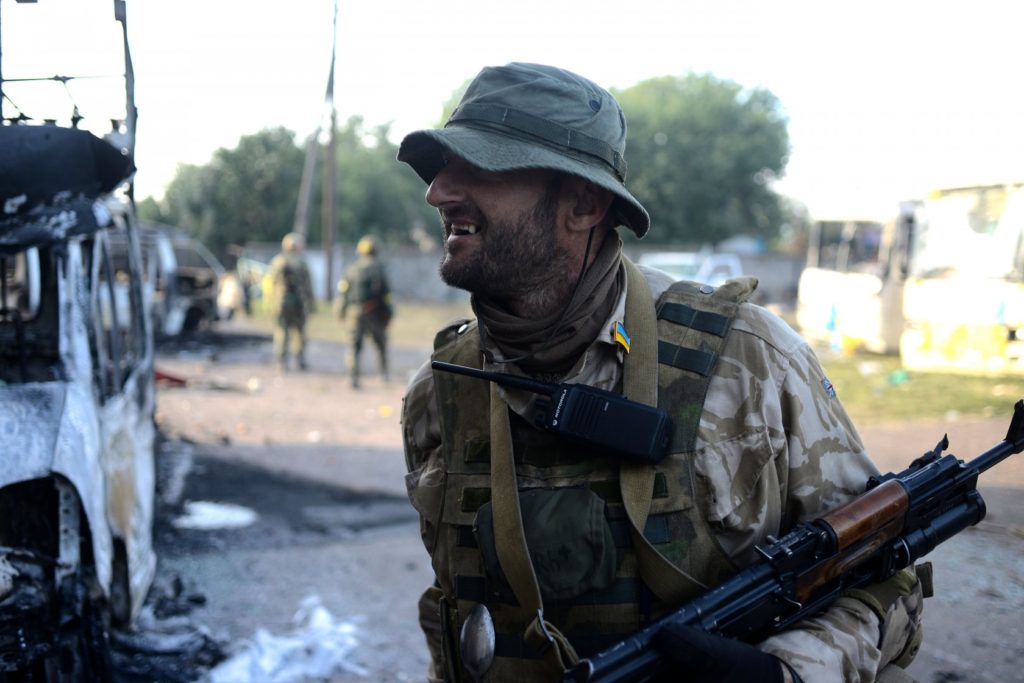
Communication at the checkpoint was very bad. My friend Grisha from Kyiv called to me he is a volunteer. And he says: “They said that the Russian troops crossed the border. What about you? Are you withdrawing or not?” And I said that I did not know anything. Nobody knew anything. We were told that it could be panic, or it could be happening something. And then the volunteers in Kyiv raised a question to get us out because we were in the cauldron, there were Russian troops. What were they doing in Ilovaisk?
And we understood that we needed to be given help to push Ilovaisk to the end, to clean it, or to take us out. As the situation was ambiguous. We sat, the artillery was shooting, it had burned all our equipment which stood near the school. Then it directly fired at the checkpoints.
In the morning, August 29, we gathered in a colony, we were at this checkpoint the last, who was taken because the colony was formed from school. We drove in the colony. Rumors went that there would be a corridor, that there was some kind of consistency, but that was all at the level of rumors. Then they said that we would break through. There was a colony. We were driving, shooting; somewhere in the distance smoke was burning, as in front of the colony. I drove in a car with my friend after the sapper. We were under the fire, then we saw this shooting, tanks, ran to Krasnoselskoe, where there was a battle. A lot of people were dead.
The sappers were ahead of us, their car was shot. We moved into a ditch – something happened to the wheels. It was just a simple car, it could not move. We ran out of the car, through the field, everything was burning, bullets were whistling. You did not understand what and where was happening. Then arrived the Ural (the type of a truck), which stopped. I still do not know who to thank for those, that we were seen, dragged into this Ural. We continued our way. Then we saw our guys. We stopped. I dragged the wounded Monaha (call sign) into the car. His collarbone was broken. Then we reached Krasnoselskoe. Their tanks were shot. And that’s all. Then … then the captivity.
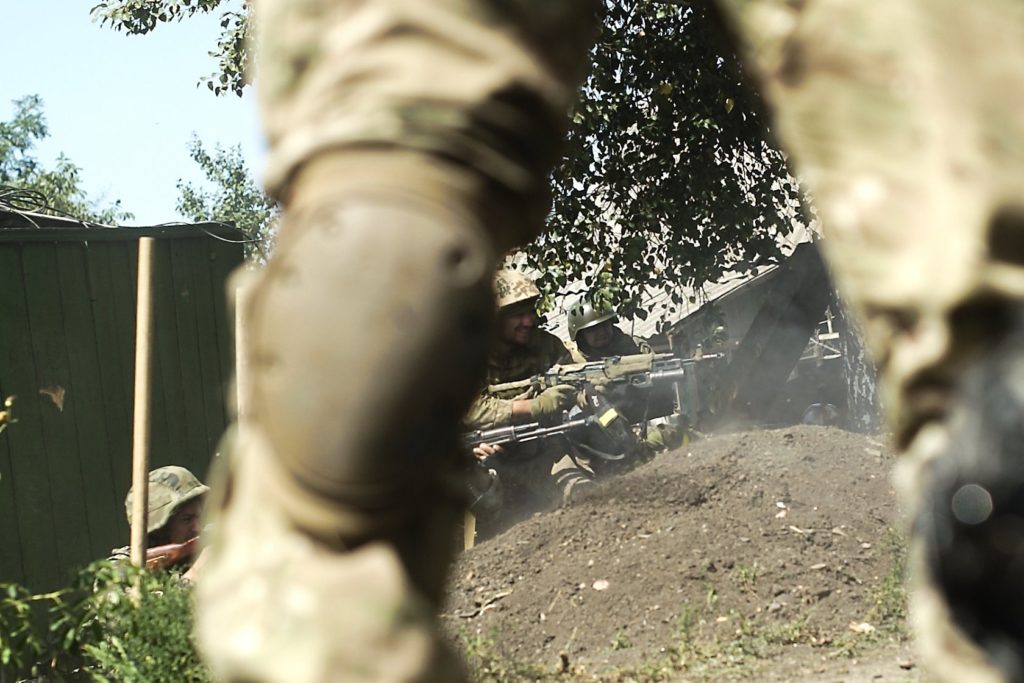
The captivity lasted four months, until 26 December. There was a lot of death among us during the so-called truce. We went to Krasnoselskoe to gather the bodies of our friends. There were a lot of dead. There were about 80. In general, Ilovaisk is more than 120 people in captivity, 80 were dead and a lot of wounded. That was a bloody “green” corridor.
During the truce, our guys captured Russian military there were paratroopers. There were rumors that we, at last, would be given a “green corridor” that we needed to get out. That Poroshenko and Putin negotiated and we would be withdrawn. And there was a time when it was agreed with one side, there was a call sign Lis, the commander of the Russian unit, which controlled one flank. There was consistency that we would be released.
That was, one of the ambiguous situation, we were ambushed, we had to get out, and we agreed that with the flank. And so, the call sign Yatsek, the platoon commander, he was negotiating. The Russians came to us with white flags. We thought they were giving up to us. Then, as it turned out, they had identification marks. That was hybrid war and meanness.
It was necessary to have two volunteers who were supposed to go to the Russians, to agree the moment, that there was an agreement and we had to leave. Plus, we had to have machines to remove the wounded. We had a lot of them and we until the last hoped that we would go out in a colony.
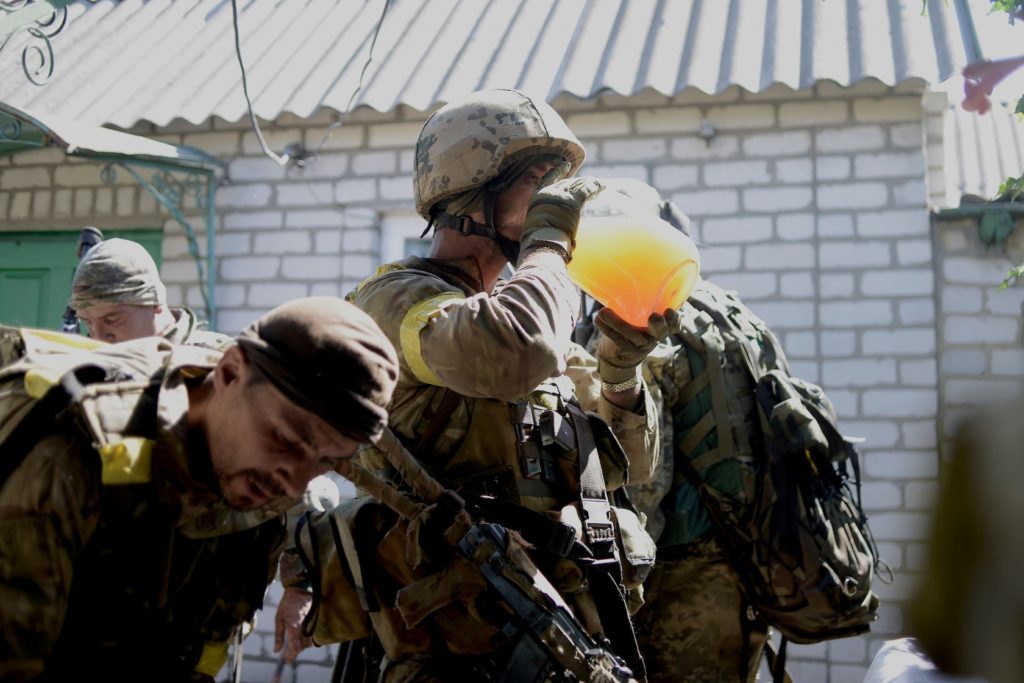
I went with my friend to the left flank, there was a meeting with the Russians. I stood talking, and my friend went to their elders. The question was solved, that we would leave in a colony. There was practically no shelling, but something flew from time to time. At that time, we could not understand. That is, we saw the Russians on the one side, we saw them on the other, and we understood that somewhere they had artillery.
We were told that no one knew anything about the exit and the car for the wounded, and we needed to wait.” If you had a sign to go out, then, of course, go out.” We came, reported to Yatsek, he went back to the negotiations. He was captured there. Not released
Then Horst, the commander of my company’s platoon, said that we had to count the dead. I and the call sign Zink went again to those Russians, to agree not to shoot if we passed the field and counted the dead. We were given one Russian who was walking behind us with a vending gun and we passed along this entire colony. I swear, and Zinc will confirm that from the beginning of the colony, as could be identified by the tattered bodies, we counted about 80 dead. That was not only our subdivision Donbass, there were also others.
This Maidan was indicative of how people came out in large numbers. I thought that within a year we would be all right. We would clean everything up quickly … But it would have been so if it was not Russia.
There was a state, I did not know how to explain it when you talked and understood the savagery of the situation. When there was a fight, and now you were standing and talking to them. And you could not understand the adequacy and inadequacy of the situation. And they were talking and looking at you as if you were an alien.
We asked them. We talked with soldiers and they told us that they had a command to release everyone from Ilovaisk, and not let anyone in Ilovaisk. And they were waiting for some kind of mythical “Pravyi Sector”, which was supposed to enter Ilovaisk. And then our colony was moving. And it’s unclear who started shooting, and they also started shooting. It was obvious that that was all nonsense, but the point was that those were said by the
Russian military. As he said he was from Ryazan. They were some grimy, dirty, with white stripes on their elbows, on their knees. They were small, short height. And he said with some horror that they did not expect such persistence from us. And they just had not expected. Their tanks were dug, they shot directly to our buses, to our cars, and we resisted.
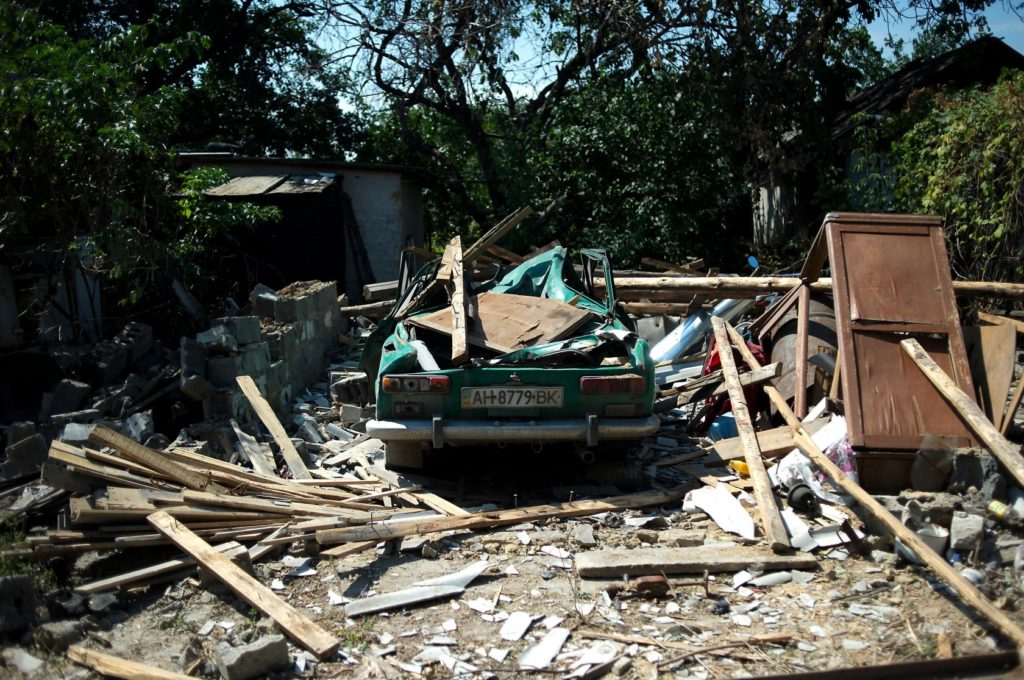
There was a situation when they did not have a doctor and they addressed us during this “truce”. As far as I understood from our conversation, that they had about 30 dead as a result of this clash with us. Again, they were in ambush, they were ready, they were splitting with direct fire, and we had put up such resistance. Therefore, they were in shock. Because they thought we were mega-super special forces. And then they saw that we were not really military people. And the word volunteer was terrible for them. Volunteer in their understanding is a superman, a super-military, super-commander who is ready for war, goes and fights. It was difficult to explain to them that those were people who led civil life three or four months ago, and they did not think about the war and now they took a weapon it was nonsense for them.
From the conversations, I realized that they were contractors. They stood somewhere on the border, then went to the fratricidal war. They did not go deeply into our events. They were not interested in it. They were told that they had crossed the border, they were afraid, and that was Ukraine, here was the colony, you needed to shoot. So that’s how was from their part. They did not hide that they were Russians. They were persuaded that some Bandera men would kill for the Russian language. My communication with them in Russian was a hacking pattern. They could not put together that picture that was in the head and the one that they saw before their eyes.
I, of course, thought that everything would be in a different way. The first Maidan, I was disappointed. After Yushchenko, how he took that Yanukovych to himself. This Maidan was indicative of how people came out in large numbers. I thought that within a year we would be all right. We would clean everything up quickly … But it would have been so if it was not Russia. Because it’s two big differences to fight with drug and drunk addicted and fight with the military personnel.

